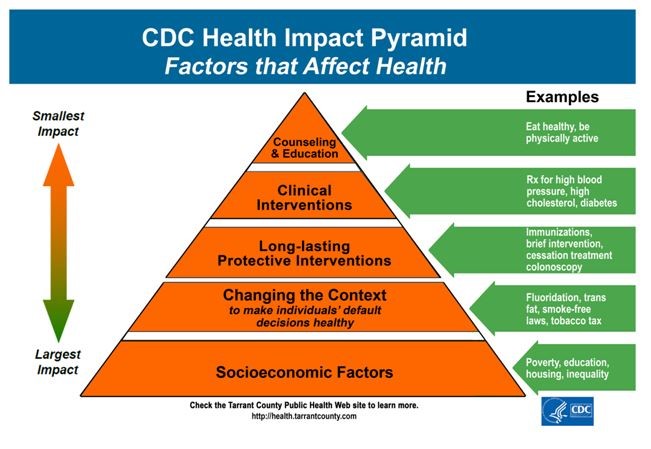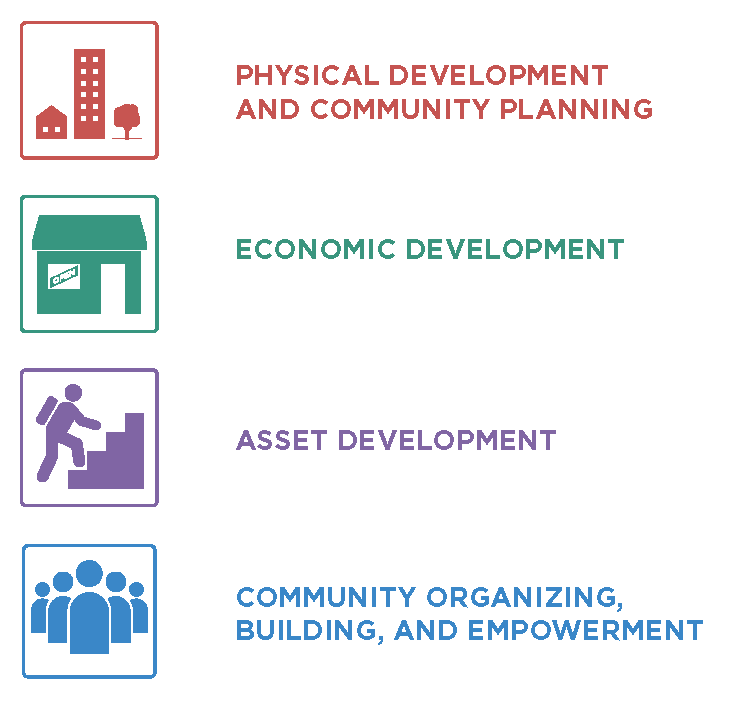A Health Impact Assessment, or HIA, evaluates the potential effects policies, plans, programs, or projects will have on the health of a community, neighborhood, or other population. It also examines the distribution of effects within a population – by demographic, location, and other factors.
HIAs also offer recommendations to enhance the positive health impacts of policies and development projects and to eliminate, reduce, or mitigate negative impacts on health.
The Process:
HIAs are performed with diverse methods, tools, and processes, but typically follow a six-step process:
- Screening: Determine whether the HIA is likely to succeed and add value.
- Scoping: In consultation with stakeholders, create objectives for the HIA and an outline for the steps that will identify potential health risks and benefits.
- Assessment: Describe the baseline health of people and groups affected by the change and predict the potential health effects.
- Recommendations: Develop practical solutions and strategies that can be implemented within the political, economic, or technical limitations of the proposed change.
- Reporting: Disseminate the findings to decision makers, affected communities and other stakeholders.
- Monitoring and Evaluation: Monitor the changes in health or health risk factors and evaluate the efficacy of the measures implemented and the HIA process as a whole.
JUMP-TO SECTION
Health Impact Assessments
Community-Driven:
By engaging with community members to identify opportunities to reduce health inequities, MAPC can help identify the interests and observations of community members.
Small Business Technical Assistance:
In collaboration with the Harvard Center for Population and Development Studies, the HIA on Massachusetts’ Small Business Technical Assistance is to better understand the links between the program and health findings to inform program funding and decision-making.
Community Investment Tax Credit:
MAPC worked with partners to conduct an HIA on the Community Investment Tax Credit Grant Program. It examined connections between community development activities and health and identified health metrics that could be measured and evaluated with information provided by community development corporations.
MAPC
Promoting Smart Growth & Regional Planning
Why It’s Important:
The literature and research tell us that contextual (see second-to-bottom tier on the pyramid) and socioeconomic factors (see bottom tier on the pyramid) have the greatest impact on our health. But that impact can be indirect or hard to measure.
HIA is a tool that connects fundamental contextual and socioeconomic factors to health, which makes HIA a tool for incorporating health into all policies.
Additional Resources

community-based
Health Impact Assessments
Combined with the unique strengths of public agencies and academic partners, this approach can help cultivate greater community awareness of HIAs, lead to meaningful engagement with vulnerable populations, and empower community members to identify opportunities to reduce health inequities.
In 2016, members of MAPC’s Public Health Department, in partnership with the Department of Urban Studies and Planning at the Massachusetts Institute of Technology, reached out to community-based organizations about programs that could benefit from an HIA. In Spring 2016, two topics were identified: a proposed state law expunging juvenile criminal records and a city ordinance in Boston that would prevent evictions except for “just cause.”
MAPC and MIT worked with a group of graduate planning students, Lowell-based teen center UTEC, and the Boston-based community organization City Life/Vida Urbana to explore these topics using HIA. Michael Blanding, one of the participants of this discussion, presented their conclusions in the MIT News article titled Assessing health impacts of policies and plans.
The Rapid HIA work was supported by a grant from the Health Impact Project, a collaboration of the Robert Wood Johnson Foundation and The Pew Charitable Trusts. The views expressed are those of the author(s) and do not necessarily reflect the views of The Pew Charitable Trusts or the Robert Wood Johnson Foundation.
The reports for these HIAs are now available:
Learn more about the Rapid HIA of Massachusetts Bill S.900, which proposes to expunge juvenile criminal records throughout the state.
Learn more about the Rapid HIA of the Just Cause Eviction Ordinance proposed in the City of Boston.
Related Resources:
The Rapid HIA work occurred was supported by a grant from the Health Impact Project, a collaboration of the Robert Wood Johnson Foundation and The Pew Charitable Trusts.
The views expressed are those of the author(s) and do not necessarily reflect the views of The Pew Charitable Trusts or the Robert Wood Johnson Foundation
For More Information:
For more information contact the Director of the Public Health Department Barry Keppard, at 617-933-0750 or [email protected], or any member of the Public Health team at MAPC.
Much appreciation goes out to the graduate planning students and two community organizations who lead and completed these reports.
small business technical assistance
Health Impact Assessments
Background
Small businesses have a profound economic impact on Massachusetts – that is well known. But what of their health impact? How does the Commonwealth’s Small Business Technical Assistance program, which helps underserved and disadvantaged businesses with fewer than 20 employees, improve the physical and mental health of owners and employees? Can that benefit extend to customers, surrounding neighborhoods, nearby residents and other businesses?
Why It's Important
Small business development and growth is a topic that has yet to be fully explored through the use of health impact assessments (HIA). While higher incomes and employment are correlated with positive health outcomes, the connections between economic development policies and programs, including small business development initiatives, and health outcomes are not well understood. Most prior research on these connections has been confined to links between increased affordable housing stock and the beneficial health effects of housing choice, stability, and quality, although some recent reports have highlighted the health impacts of community and small business development work more generally.
MAPC's Role
The Metropolitan Area Planning Council and the Harvard Center for Population and Development Studies are conducting a HIA on Massachusetts’ Small Business Technical Assistance. Our goal is to better understand the links between the program and health outcomes, and to use our findings to inform program funding and decision-making. The HIA is being performed in coordination with the Massachusetts Growth Capital Corporation and the Massachusetts Association of Community Development Corporations.
Participation in the HIA
Participation is an essential element of an HIA. We believe stakeholders provide perspectives and input that capture shared as well as unique experiences.
In this HIA, we will engage with a wide range of people who are familiar with small businesses in Massachusetts. These will include those who are funded by the Small Business Technical Assistance program, individuals and organizations with small business and public health expertise, and experts from state agencies, academic settings, and non-profit organizations.
If you are interested in learning more about the HIA or providing feedback, please contact us (information below).
SBTA HIA:
Small Business Technical Assistance Health Impact Assessment - Full Report
Small Business Technical Assistance Health Impact Assessment - Executive Summary
HIA Communication Resources
February One-Pager for the SBTA HIA: Introducing the HIA
March One-Pager for the SBTA HIA: Keeping Residents Employed - and Healthy
May One-Pager for the SBTA HIA: The Social Impact of Local, Small Businesses
August One-Pager for the SBTA HIA: Health, Prosperity, and Immigrant-Owned Businesses
Questions & Comments
For more information about the SBTA HIA, please contact Public Health Manager Barry Keppard at 617-933-0750 or [email protected] or Mariana Arcaya, Assistant Professor at the Massachusetts Institute of Technology School of Architecture + Planning, at [email protected].
This HIA is supported by a grant from the Health Impact Project, a collaboration of the Robert Wood Johnson Foundation and The Pew Charitable Trusts. www.healthimpactproject.org
The views expressed are those of the author(s) and do not necessarily reflect the views of The Pew Charitable Trusts or the Robert Wood Johnson Foundation
community investment tax credit
Health Impact Assessments
Background
MAPC, in collaboration with Health Resources in Action (HRiA) and the Massachusetts Department of Public Health (MDPH), conducted a health impact assessment (HIA) to inform the Massachusetts Department of Housing and Community Development (DHCD) as it developed a new funding opportunity for community development corporations (CDCs): the Community Investment Tax Credit Grant Program (CITC Grant Program).
The HIA examined connections between community development activities and health, and identified health metrics (health outcomes that result from the investment of tax credits in communities) that could be measured and evaluated with information provided by CDCs.
Why It's Important
The core activities of CDCs are intimately linked to the physical, mental, and social determinants of health in the communities they serve; however, this relationship has yet to be fully explored and
documented.
Since CITC funds will impact CDC core activities, the additional resources will likely impact health as well. Thus, the goal of the CITC HIA was to investigate how and to what extent CDC activities affect these health determinants, how the CITC program may impact these activities, and consequently, community health across the state.
For example, certain activities, such as the development of affordable housing, may be funded and maintained at current rates, whereas other activities, like resident services and community empowerment initiatives, may be given additional funding.
A secondary goal of this HIA was to begin to document how community development activities as a whole affect health and to provide additional relevant and actionable information that can be used to evaluate local health impacts and benefits of these activities. This understanding will provide useful and actionable information that can be used by CDCs as they promote their work, build partnerships, and seek funding.
MAPC's Role
MAPC led the development of the HIA on behalf of the project team. In addition, MAPC supported the development of communication materials, including a series of videos and a white paper, which were developed by HRiA in unison with the HIA and further explored the connections between community development work and health.
Additional Resources:
Pathway diagrams for the CITC HIA
Physical Development and Community Planning, Economic Development, Asset Development, and Community Organizing, Building, and Empowerment.
Video: Upstream investments: How CDCs Impact Public Health
Video: Demonstrating the Difference: Strategies for Harnessing Data and Partnerships
Questions?
For more information about MAPC and the CITC HIA, please contact Public Health Planner and Research Analyst Noémie Sportiche at 617-933-0716 or email [email protected], or Public Health Manager Barry Keppard at 617-933-0750, or [email protected].
For project communications, please contact Brittany Chen, Senior Program Manager, Training and Capacity Building at HRIA, at 617-279-2240, ext 324, or [email protected].

public health
MAPC’s Public Health Committee meets regularly to discuss current and emerging health priorities at MAPC.
Meeting Schedule












